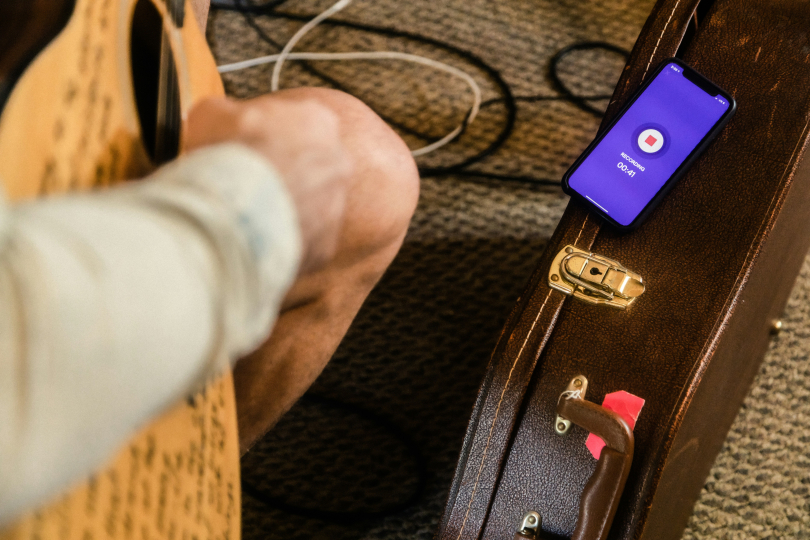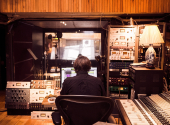
5 Musical Problems Recognizable Even In a Demo
In 2025, we no longer send demos to producers to present ourselves. That's the task for quality recordings. However, when working on them, a demo can serve us well. This article is going to show you how a demo can be helpful.
Although it's better to have a demo recorded in separate tracks for other production tasks, even a simple recording on your mobile phone would do for the start. What can you tell from it? The starting point is that if something is powerful in the song (emotion, lyrics, musical idea...) that you find interesting, it should stand out even in a poor-quality recording... But then there are five other things that the demo will "tell on" you:
1. Key and tempo
The song has been primarily composed on guitar but a singer sings it. The riff sounds good in E major, but it's too deep for the vocals (especially the female one). Then you have three options: to oblige the singer and rewrite it, transpose the original riff to a different key (praise for the capo) or change the melody so that the singer, even in the original key, can use a more appropriate vocal range.
As far as the tempo is concerned, you can already notice from the demo two signs that it is necessary to slow down: the singer is jabbering the lyrics and the musicians play their parts at their max speed. A piece played a little slower but with more accuracy and energy always works better than a rushed track where everyone is playing on the edge, gasping.
2. Song structure
Too long, too short, too repetitive... A mobile demo is enough to expose the inappropriate form of your song. If a song seems long, it doesn't necessarily need to be shortened, it just needs to be rearranged so that – if it's not intentionally meant to seem long - it gives an impression of a shorter piece, in other words, engages the audience with each part in such a way that it doesn't even feel long. But shortening it radically is also a fine option.
3. Individual parts
Already at the demo stage, you may discover that a specific part covers the vocals too much, that it is inaccurate and does not correspond to the logic of the song... Really big mistakes can be heard even when a song is recorded on a mobile phone and it's good to eliminate them right from the very beginning.
The most common are these three problems:
- An instrumental part covers the vocal too much. In the vast majority of genres and situations, the singing is simply the main thing; you should be able to hear the lyrics quite clearly at every moment. Even the very best (for example, guitar) lick should not interfere with the singing.
- All players play the same thing, there is no contrast in the recording. When the piano plays rhythmic chords, there's little reason why the guitar and bass should attempt to do the same. When one part is doing layers, the other can play some rhythmic motif.
- Bass and drums are not friends. Often the bass, even from the demo, comes across more like another rushed guitar part without much connection to what the drummer is doing. Honour all exceptions, but in most situations, it doesn't do any good.
4. The beginning of the song
Should be catchy even from a mobile phone. I'm not a big fan of it, but even a long intro, if it builds tension with a closure, can make sense. But I'd recommend composing a short punchy intro first. Try a little test: someone says, "You know that song of theirs, it starts..." And even an untrained voice can imitate those three notes from "Smoke on the Water". Can you imagine doing the same for your song?
5. The chorus
If it's a song based on a chorus, which is most cases, then even from a poor-quality mobile phone, an unbiased listener should be able to tell to find it. The best mix and sound quality won't help with that. Arrangements can help slightly, but it's better if the chorus is identifiable already in the demo. Also, even an untrained listener should be able to remember a part of the chorus lyrics that will keep playing in their heads after the first hearing it.
Tip at the end: instead of a mobile phone you can use a recording device ( for example Zoom makes good ones) or a laptop microphone. Just anything... Ideally, eventually, your rehearsal room should allow you to record a demo in separate tracks for other arrangements, but we'll talk about that another time.

Would you like feedback on your demo so you can have a better version of your song ready for the studio? Get back to me at sladek.jan@gmail.com
If you have found an error or typo in the article, please let us know by e-mail info@insounder.org.





